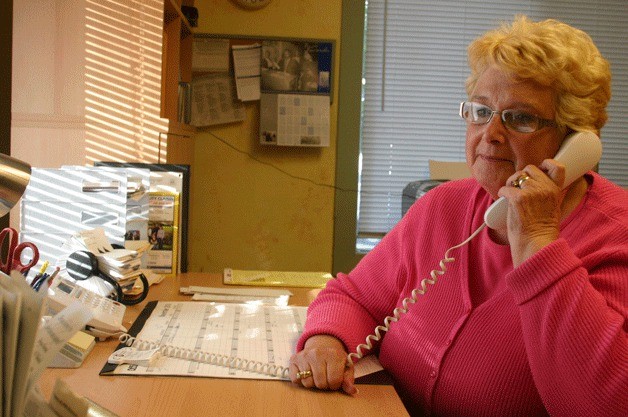It’s tough to help others when you need it yourself.
Helping Hand of South Whidbey, a front-line nonprofit organization assisting local people with basic needs, is running on empty.
“We’re out of money,” said Rosemary Martin, Helping Hand executive director. “It’s the age-old story. Donations are down, and demand is up.”
Throw in the forecast of a hard winter, and the outlook is bleaker still.
“It keeps me awake at night, worrying about cold weather, and what these people are going to do,” she said.
Christian-based Helping Hand, headquartered in Langley and serving those in need from Greenbank south, began turning away clients on Friday, Oct. 29, Martin said Thursday.
“We never get down to zero, but we got pretty close,” she said. “We need to keep a reserve to pay our own utility bills.”
Helping Hand focuses primarily on short-term emergencies, such as paying a month’s rent or an electric bill, or for emergency home or car repairs.
In the past 18 months, as the economy has steadily soured, the group has concentrated on basics such as rent and utilities.
“We’re a temporary stopgap,” Martin said. “Anything to keep people warm and a roof over their heads.”
This year, Helping Hand’s nine volunteer staff members assisted 276 South End residents through October, distributing more than $39,000, Martin said. Those receiving the money had a total of 168 children living with them, she added.
The group also refers people to other agencies, Martin said; 247 referrals have been made so far this year.
Helping Hand limits its assistance to $400 per year per client. As funding diminishes, that amount is reduced by $100 increments. Last week, reluctantly, clients were told the well was dry, Martin said.
Later this month, the group’s eight-member board will send out its annual appeal letter, and contributions again may begin to trickle in, Martin said.
She predicted that Helping Hand would be up and running again in less than a month.
“I’m an optimistic person,” Martin said. “I believe that the money will come, and the community will step up when it knows the need.”
Helping Hand of South Whidbey was established in 1981 by local churches as primarily a counseling hotline. In 1986, the group moved to its present location across Camano Avenue from the Island County Fairgrounds in Langley.
Funds have come from churches, community organizations, private donors and foundation grants, Martin said.
She said volunteers are trained to help people facing a variety of personal, financial and family troubles. Grants are made to clients for short-term needs such as rent and utilities, and there are referrals and followup counseling if necessary.
Clients aren’t required to repay the grants, but are encouraged to contribute later, to help others, if they come into extra money.
Meanwhile, Martin said Helping Hand, with assistance from Puget Sound Energy, is promoting energy conservation as a way to help people keep their utility bills low.
“We’re really encouraging clients to be proactive in any way possible,” she said.
Martin said most of the organization’s clients are women, from single mothers trying to make ends meet to grandmothers caring for their grandchildren.
She said Helping Hand has been hit hard by the same economic squeezes being felt by other nonprofit organizations — diminishing donations and cuts in government programs that traditionally contribute.
Opportunity Council, a clearinghouse in the county for what used to be called state and federal block grants, and a major contributor to Helping Hand, expects to have more than 40 percent fewer available funds in the next year, Martin said.
Unlike Opportunity Council, which has income restrictions, Helping Hand “has no restrictions whatsoever,” Martin said.
Martin has headed Helping Hand for a little more than a year, her first foray into nonprofit administration. She has had a summer home on South Whidbey since 1987, and has been a permanent resident since 1998.
Martin said the need on the island isn’t always apparent, but it’s depressingly real.
“If you’re doing OK, it’s easy to think everybody’s doing OK,” she said. “You have to be on the front lines to see how bad it gets on our beautiful island.
“There are people living in the woods, or living in their cars at the park-and-rides,” she said.
“That person you get your latte from might be a single mother with one or two children, trying mightily to keep a roof over her head,” Martin added. “One little thing happens, and her whole world tumbles down.
“Those are the kinds of people who end up on our doorstep,” she said.
Helping Hand of South Whidbey is at 816 Camano Ave. and is open from 9 a.m. to noon Monday through Friday.
For more information, or to make a donation, call 221-7777 or write to PO Box 661, Langley WA 98260. Donations are fully deductible, Martin said.



